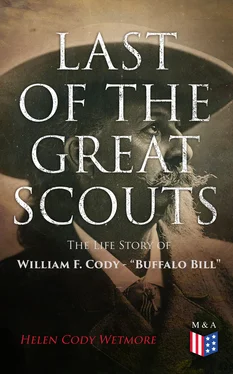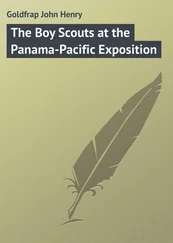"I hope," he said to mother, "that these clouds will soon pass away, and that we may have a happy home once more." Then, placing his hands on Will's head, "You will have to be the man of the house until my return," he said. "But I know I can trust my boy to watch over his mother and sisters."
With such responsibilities placed upon his shoulders, such confidence reposed in him, small wonder that Will should grow a man in thought and feeling before he grew to be one in years.
Father reached Fort Leavenworth in safety, but the quarrel between the pro-slavery party and the Free Soilers waxed more bitter, and he decided that security lay farther on; so he took passage on an up-river boat to Doniphan, twenty miles distant. This was then a mere landing-place, but he found a small band of men in camp cooking supper. They were part of Colonel Jim Lane's command, some three hundred strong, on their way West from Indiana.
Colonel Lane was an interesting character. He had been a friend to Elijah Lovejoy, who was killed, in 1836, for maintaining an anti-slavery newspaper in Illinois. The Kansas contest speedily developed the fact that the actual settlers sent from the North by the emigrant-aid societies would enable the Free State party to outnumber the ruffians sent in by the Southerners; and when the pro-slavery men were driven to substituting bullets for ballots, Colonel Lane recruited a band of hardy men to protect the anti-slavery settlers, and incidentally to avenge the murder of Lovejoy.
The meeting of father and Lane's men was a meeting of friends, and he chose to cast his lot with theirs. Shortly afterward he took part in "The Battle of Hickory Point," in which the pro-slavery men were defeated with heavy loss; and thenceforward the name of Jim Lane was a terror to the lawless and a wall of protection to our family.
The storm and stress of battle had drawn heavily on what little strength was left to father, and relying for safety upon the proximity of Colonel Lane and his men, he returned to us secretly by night, and was at once prostrated on a bed of sickness.
This proved a serious strain upon our delicate mother, for during father's absence a little brother had been added to our home, and not only had she, in addition to the care of Baby Charlie, the nursing of a sick man, but she was constantly harassed by apprehensions for his safety as well.
CHAPTER IV. — PERSECUTION CONTINUES.
Table of Contents
MOTHER'S fears were well grounded. A few days after father had returned home, a man named Sharpe, who disgraced the small office of justice of the peace, rode up to our house, very much the worse for liquor, and informed mother that his errand was to "search the house for that abolition husband of yours." The intoxicated ruffian then demanded something to eat. While mother, with a show of hospitality, was preparing supper for him, the amiable Mr. Sharpe killed time in sharpening his bowie-knife on the sole of his shoe.
"That," said he to Will, who stood watching him, "that's to cut the heart out of that Free State father of yours!" And he tested the edge with brutally suggestive care.
Will's comment was to take down his rifle and place himself on the staircase leading up to father's room. There was trouble in that quarter for Mr. Sharpe, if he attempted to ascend those stairs.
But the justice, as mother surmised, had no notion that father was at home, else he would not have come alone. He ate heartily of the supper, which Will hoped would choke him, and passing from drowsiness to drunken slumber, soon tumbled from his chair. This so confused him that he forgot his pretended errand, and shambled out of the house. He was not so drunk that he could not tell a good bit of horseflesh, and he straightway took a fancy to Prince, the pet pony of the family. An unwritten plank in the platform of the pro-slavery men was that the Free Soil party had no rights they were bound to respect, and Sharpe remarked to Will, with a malicious grin:
"That's a nice pony of yours, sonny. Guess I'll take him along with me." And he proceeded to exchange the saddle from the back of his own horse to that of Prince.
"You old coward!" muttered Will, bursting with wrath. "I'll get even with you some day."
The justice was a tall, burly fellow, and he cut so ridiculous a figure as he rode away on Prince's back, his heels almost touching the ground, that Will laughed outright as he thought of a plan to save his pony.
A shrill whistle brought Turk to the scene, and receiving his cue, the dog proceeded to give Sharpe a very bad five minutes. He would nip at one of the dangling legs, spring back out of reach of the whip with a triumphant bark, then repeat the performance with the other leg. This little comedy had a delighted spectator in Will, who had followed at a safe distance. Just as Sharpe made one extra effort to reach Turk, the boy whistled a signal to Prince, who responded with a bound that dumped his rider in the dust. Here Turk stood over him and showed his teeth.
"Call off your dog, bub!" the justice shouted to Will, "and you may keep your little sheep, for he's no good, anyway."
"That's a bargain!" cried Will, restored to good humor; and helping the vanquished foe upon his own steed, he assured him that he need not fear Turk so long as he kept his word. Sharpe departed, but we were far from being rid of him.
About a fortnight later we were enjoying an evening with father, who was now able to come downstairs. He was seated in a big arm-chair before the open fire, with his family gathered round him, by his side our frail, beautiful mother, with Baby Charlie on her knee, Martha and Julia, with their sewing, and Will, back of mother's chair, tenderly smoothing the hair from her brow, while he related spiritedly some new escapade of Turk. Suddenly he checked his narrative, listened for a space, and announced:
"There are some men riding on the road toward the house. We'd better be ready for trouble."
Mother, equal to every emergency, hurriedly disposed her slender forces for defense. Martha and Julia were directed to help father to bed; that done, to repair to the unfurnished front room above stairs; Will was instructed to call the hired man and Jane, who was almost as large and quite as strong as the average man; and the three were armed and given their cue. They were all handy with their weapons, but mother sought to win by strategy, if possible. She bade the older girls don heavy boots, and gave them further instructions. By this time the horsemen had reached the gate. Their leader was the redoubtable Justice Sharpe. He rode up to the door, and rapped with the but of his riding-whip. Mother threw up the window overhead.
"Who's there? and what do you want?" she demanded.
"We want that old abolition husband of yours, and, dead or alive, we mean to have him!"
"All right, Mr. Sharpe," was the steady answer. "I'll ask Colonel Lane and his men to wait on you."
The hired man, who had served in the Mexican War, here gave a sharp word of command, which was responded to by trampling of heavy boots upon the bare floor. Then, calling a halt, the pretended Colonel Lane advanced to the window, and shouted to the horsemen:
"Set foot inside that gate and my men will fire on you!"
Sharpe, an arrant coward, had retreated at the first sound of a man's voice, and after a short parley with his nonplused companions, he led them away—outwitted by a woman.
As a sort of consolation prize, Sharpe again made off with Prince; but Will's sorrow in the morning was short-lived, for the sagacious little creature slipped his halter and came flying home before the forenoon was half spent.
After this experience, father decided that, for our sakes as well as for his own, he must again leave home, and as soon as he recovered a measure of his strength he went to Grasshopper Falls, thirty-five miles west of Leavenworth. Here he erected a sawmill, and hoped that he had put so many miles between him and his enemies that he might be allowed to pursue a peaceful occupation. He made us occasional visits, so timing his journey that he reached home after nightfall, and left again before the sun was up.
Читать дальше












